In today’s fast-moving digital landscape, launching an ecommerce store is only half the battle. The real challenge lies in driving meaningful traffic, converting visitors into loyal customers, and scaling revenue in a sustainable way. Whether you’re just starting or looking to turbocharge your existing online presence, choosing the right ecommerce marketing agency can make or break your success.
With hundreds of agencies out there promising dramatic results, it’s easy to feel overwhelmed. But the truth is, not all agencies are created equal. Selecting a partner with proven experience, industry know-how, and the ability to execute personalized strategies is critical for explosive online growth. This guide outlines everything you need to consider before making that pivotal decision.
Why an Ecommerce Marketing Agency Matters
An ecommerce marketing agency does more than run ads or schedule social media posts. A great agency serves as a growth partner. Here’s what a strong team brings to the table:
- Strategic planning: Creating data-driven strategies tailored to your business goals.
- Expertise in multiple channels: SEO, PPC, email marketing, influencer outreach, CRO, and more.
- Scalable solutions: Built to evolve as your business grows and the market shifts.
- Performance tracking: Real-time analytics to monitor and optimize KPIs.
If done right, working with an ecommerce marketing agency turns marketing from an expense into a revenue-generating machine.
Step-by-Step Guide to Choosing the Right Agency
1. Define Your Goals
Before researching potential agencies, get crystal clear on your business needs. Do you want to:
- Increase online sales by 30% in six months?
- Build a powerful brand presence on social media?
- Improve customer retention via email automation?
- Launch internationally and require multilingual campaigns?
Being specific with your objectives will help you assess whether an agency is the right fit — and will make it easier for them to craft a plan aligned with your desired outcomes.
2. Look for Ecommerce-Specific Experience
Not all digital marketing agencies understand the unique dynamics of ecommerce. Seek out agencies with a track record of growing ecommerce brands. Here are a few ways to verify this:
- Review their portfolio and case studies in the ecommerce space.
- Ask about past clients in your niche or product category.
- Check for testimonials and success metrics specifically related to online store performance.
Having direct experience with online retailers means the agency understands issues like cart abandonment, shipping logistics, product recommendation engines, and lifecycle marketing for repeat customers.

3. Evaluate Their Channel Expertise
Marketing isn’t one-size-fits-all. Your ideal agency should demonstrate deep knowledge across key ecommerce channels:
- Search Engine Optimization (SEO): To drive organic visibility and long-term traffic.
- Pay-Per-Click (PPC): For scalable paid campaigns on Google Ads and Bing.
- Social Media Advertising: Particularly Facebook, Instagram, and TikTok ads tailored for ecommerce products.
- Email Marketing: Automated flows and promotions that drive conversions.
- Conversion Rate Optimization (CRO): Maximizing ROI through website testing and improvements.
- Influencer Marketing: Leveraging key voices to boost brand credibility and reach.
Look for an agency that doesn’t just run campaigns but also knows how to integrate multiple channels in a cohesive strategy tailored to the buyer journey.
4. Transparency & Performance Metrics
How will you know your marketing dollars are paying off? The best ecommerce agencies rely on performance metrics and reporting to measure impact and iterate on performance. Ask about:
- How they track sales, traffic, and ROI.
- What tools they use for analytics and insights (e.g., Google Analytics, Hotjar, Klaviyo).
- How frequently they report on performance (weekly? monthly?).
- If they offer dashboards or visual reports to keep you in the loop.
The right agency will prioritize clarity, accountability, and real numbers — not vague promises.
5. Communication & Cultural Fit
Even the best strategy will fall short if there’s no synergy. This may sound trivial, but communication relates directly to process efficiency, trust, and long-term satisfaction. Ask yourself:
- Are they easy to communicate with?
- Do they respond promptly to questions?
- Do they understand your tone, target audience, and brand identity?
Consider doing a short trial project or month-to-month contract before locking into a longer agreement. It gives both sides time to assess the rapport.
6. Customization vs. Cookie-Cutter Solutions
Your business is one-of-a-kind. Beware of agencies offering standardized packages without asking about your goals or customer base. A premium agency will take the time to:
- Understand your customer journey.
- Audit your existing marketing efforts and website.
- Run competitive research.
- Create a tailored marketing roadmap.
Growth doesn’t come from templates — it comes from innovation, data, and customization.

7. Budget Compatibility
Ecommerce marketing is an investment, not a cost. That said, you should seek out an agency that fits within your financial parameters. Agencies typically price in one of the following ways:
- Flat monthly retainer: Predictable cost, great for ongoing partnerships.
- Project-based: Good for one-time audits or strategy launches.
- Performance-based: You pay a portion based on results like revenue share or CPA targets.
Make sure you understand what’s included in their pricing — and what potential add-ons could be. Don’t automatically go with the cheapest quote; instead, focus on value and return on investment.
Red Flags to Watch Out For
Not every agency that sells itself well performs well. Here’s what to watch for:
- No mention of ecommerce success: Can’t cite case studies, metrics, or ecommerce-specific experience.
- Vague performance promises: Claim they “guarantee #1 on Google” or “double your sales overnight.”
- Poor communication: Sluggish response times or unclear deliverables.
- Lack of transparency: Unwilling to share tools, practices, or performance reporting.
Trust your gut and look for teams with a balanced mix of enthusiasm, professionalism, and transparency.
Top Questions to Ask Before Hiring
Before signing that contract, ask these critical questions:
- What ecommerce platforms are you experienced with? (Shopify, WooCommerce, BigCommerce?)
- How do you define success for a client engagement?
- What specific marketing services do you specialize in?
- Can you provide 2-3 ecommerce-specific case studies?
- What does your onboarding process look like?
- How often will we communicate?
Clear answers to these questions reveal the agency’s methodology, flexibility, and commitment to your business.
Conclusion: Set the Stage for Explosive Growth
Choosing the best ecommerce marketing agency is not just a tactical decision — it’s a strategic one. The right partner will become an extension of your team, working diligently to unlock new levels of growth and efficiency across your digital ecosystem.
Take your time, do the research, and prioritize agencies that bring genuine ecommerce expertise, proven results, and a shared commitment to your brand vision. With the right agency by your side, converting casual browsers into enthusiastic buyers won’t just be a dream — it will be the norm.